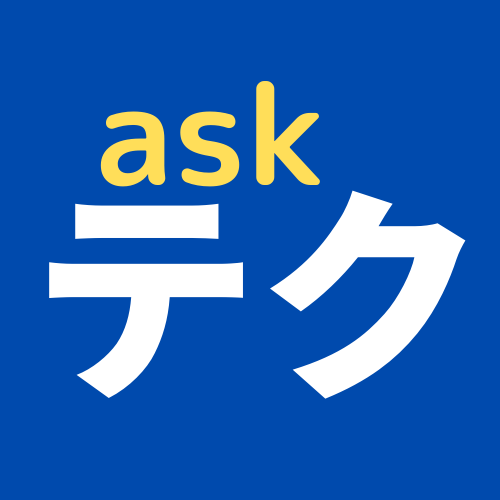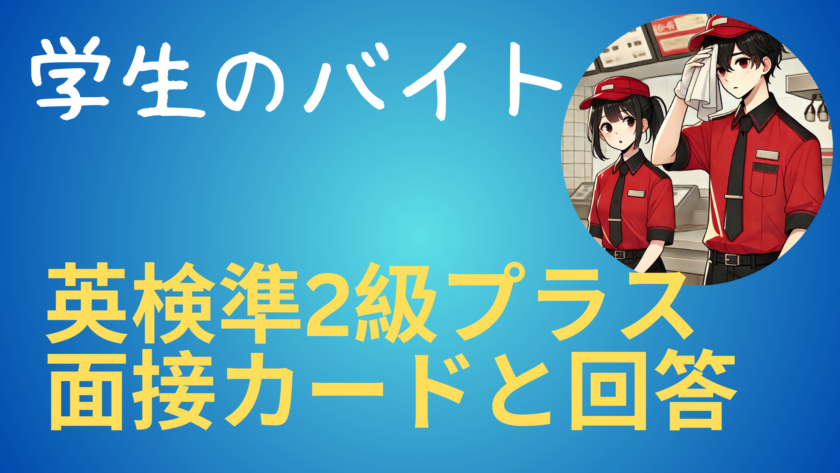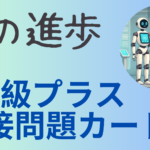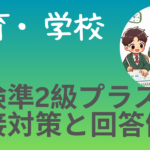目次
準2級プラス面接練習問題
パッセージ
Please read the passage silently for twenty seconds.(パッセージを20秒で黙読)
Now, please read the passage aloud.(パッセージ音読)
Part-time Jobs for Students
Many high school and college students have part-time jobs. They work at places like restaurants, convenience stores, or schools as tutors. These jobs help them earn money and learn useful skills. Students often work after school or on weekends. Some students say part-time jobs are a good way to prepare for the future.
(Word count: 53)
自分の音読も録音し、音読用mp3との違いを比較してみましょう。シャドウイング練習も効果的です。
パッセージの質問
Q1. According to the passage, when do students usually work part-time?
Answer: After school or on weekends.
イラスト描写
質問:Now, please look at the picture and describe the situation.
You have 20 seconds to prepare. Your story should begin with the sentence on the card.
「One day, Mika and her friend Jun started working at a fast-food restaurant.」
<20 seconds>
Please begin.
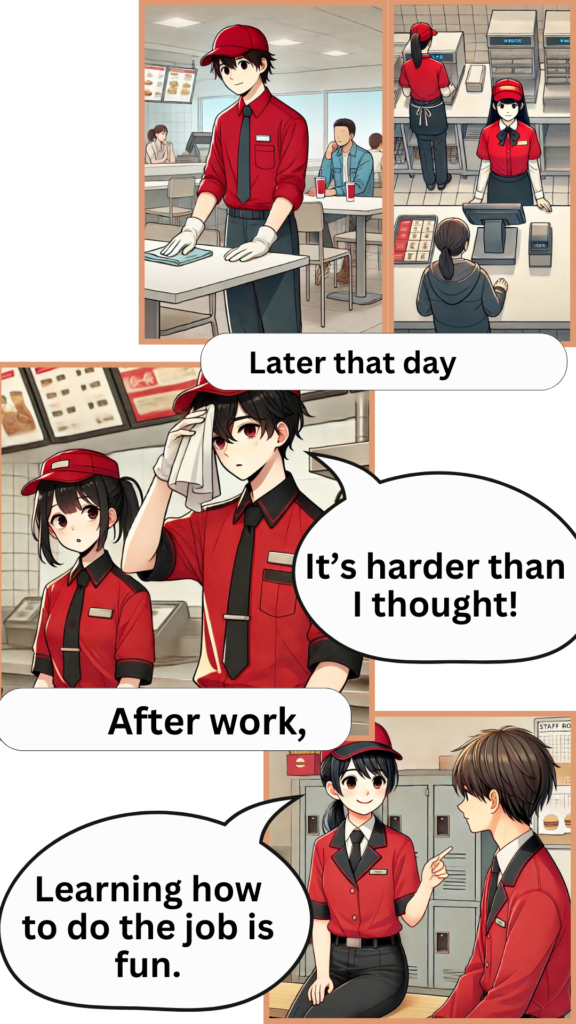
One day, Mika and her friend Jun started working at a fast-food restaurant.
ある日、ミカと友だちのジュンはファストフード店で働き始めました。
Mika helped customers at the counter, and Jun cleaned the tables.
ミカはカウンターでお客さんを手伝い、ジュンはテーブルを掃除しました。
Later that day, Jun said, “It’s harder than I thought!”
その日の後、ジュンは「思ったより大変だね!」と言いました。
After work, Mika said that learning how to do the job was fun.
仕事の後、ミカは仕事を覚えるのは楽しいと言いました。
回答例:One day, Mika and her friend Jun started working at a fast-food restaurant.
Mika helped customers at the counter, and Jun cleaned the tables.
Later that day, Jun said, “It’s harder than I thought!”
After work, Mika said that learning how to do the job was fun.
シナリオ音源
シンプルなイラスト描写に慣れてきたら、以下の少し長めバージョンにも挑戦してみよう!
少し長めのバージョン(英語)
One day, Mika and her friend Jun started working at a fast-food restaurant.
Mika was in charge of taking orders and talking with customers at the counter, while Jun worked hard to keep the tables clean.
Later in the day, Jun wiped his forehead and said, “It’s harder than I thought!” because he was tired.
After their shift, Mika smiled and said that learning new things at work was really fun and exciting for her.
ある日、ミカと友だちのジュンは、ファストフード店で初めてのアルバイトを始めました。
ミカはカウンターで注文を取ったり、お客さんと話したりする係をして、ジュンはテーブルをきれいにするために一生懸命働いていました。
その日の後半、ジュンはおでこをぬぐって「思ったより大変だね!」と言いました。
仕事が終わったあと、ミカは笑顔で「新しいことを覚えるのは本当に楽しくてワクワクする」と言いました。
Q3. 受験者の意見を問う 1
Q3: Do you think students should have part-time jobs?
Yes:
They can learn how to work with other people.
Also, they can earn money for things they need.
No:
They may not have enough time to study.
Also, they can get very tired from working.
Q4. 受験者の意見を問う 2
Q4. Question: Many people watch videos on the Internet to relax or learn new things. Do you think watching videos online is better than watching TV?
Yes の場合:
Yes.
People can choose what they want to watch anytime.
Also, online videos are often shorter and easier to enjoy.
No の場合:
No.
TV programs are sometimes better made and more interesting.
Also, watching TV with family can be more fun.
日本語訳と解説
パッセージ(英文)
Many high school and college students have part-time jobs. They work at places like restaurants, convenience stores, or schools as tutors. These jobs help them earn money and learn useful skills. Students often work after school or on weekends. Some students say part-time jobs are a good way to prepare for the future.
(語数:53語)
日本語訳:
多くの高校生や大学生はアルバイトをしています。彼らはレストラン、コンビニ、または学校で家庭教師として働いています。これらの仕事はお金を稼いだり、役立つスキルを学んだりするのに役立ちます。学生たちは放課後や週末によく働きます。アルバイトは将来の準備になると話す学生もいます。
Q1. 内容理解質問
Question: According to the passage, when do students usually work part-time?
Answer: After school or on weekends.
質問(日本語訳):
パッセージによると、学生たちはふだんいつアルバイトをしますか?
答え: 放課後や週末です。
Q2. ナレーション
ストーリー(英文)
One day, Mika and her friend Jun started working at a fast-food restaurant.
Mika helped customers at the counter, and Jun cleaned the tables.
Later that day, Jun said, “It’s harder than I thought!”
After work, Mika said that learning how to do the job was fun.
ストーリー(日本語訳)
ある日、ミカと友だちのジュンはファストフード店で働き始めました。
ミカはカウンターでお客さんを手伝い、ジュンはテーブルを掃除しました。
その日の後、ジュンは「思ったより大変だね!」と言いました。
仕事の後、ミカは仕事を覚えるのは楽しいと言いました。
Q3. 意見質問 1
Question: Do you think students should have part-time jobs?
学生はアルバイトをすべきだと思いますか?
Yes(はい):
They can learn how to work with other people.
Also, they can earn money for things they need.
Yes(日本語訳):
人と協力して働くことを学べます。
また、必要なものを買うためのお金も稼げます。
No(いいえ):
They may not have enough time to study.
Also, they can get very tired from working.
No(日本語訳):
勉強する時間が足りなくなるかもしれません。
また、仕事でとても疲れてしまうこともあります。
Q4. 意見質問 2
Intro + Question:
No. 4 4 Many people watch videos on the Internet to relax or learn new things.
Do you think watching videos online is better than watching TV?
No.4 日本語訳:
No. 4 多くの人がリラックスしたり、新しいことを学んだりするためにインターネットで動画を見ます。インターネットで動画を見ることは、テレビを見るより良いと思いますか?
Yes の理由:
・見たいものをいつでも選べる。
・オンライン動画は短くて気軽に楽しめる。
No の理由:
・テレビ番組の方がよく作られていて面白い時もある。
・家族と一緒に見る方が楽しいこともある。
おっと、失礼しました!
日本人向けの記事であることを踏まえて、以下のように修正いたします👇
コラム:オンライン動画を見ることの良い点・悪い点
最近では、特に中高生を中心に「YouTube」や「TikTok」などの動画を見る人が増えています。英検準2級プラスの面接でも、「オンライン動画とテレビ、どちらがいいか?」といったテーマが出ることもあります。ここでは、動画視聴のメリット・デメリットをネイティブがよく使う表現とともに紹介します。
オンライン動画の良い点(メリット)
1. いつでも、どこでも見られる
→ 英語:You can watch anytime, anywhere.
テレビのように放送時間を気にする必要はありません。
2. 好きな内容がすぐに見つかる
→ 英語:It’s easy to find content you like.
勉強、料理、ゲーム実況など、興味に合った動画が選べます。
3. 学べる動画もたくさんある
→ 英語:Some videos are very educational.
英語学習動画や科学解説など、勉強に役立つものも豊富です。
🗣 ネイティブがよく使う表現:
“binge-watch”(ビンジ・ウォッチ)
→ たくさんの動画やドラマを一気に見ること。
例:I binge-watched YouTube all night.
(夜通しユーチューブを見まくった)
オンライン動画の悪い点(デメリット)
1. 時間をムダにしてしまうこともある
→ 英語:It can be a time-waster.
「1本だけ」のつもりが、何時間も見てしまうことも…。
2. 目や体に悪いことがある
→ 英語:Too much screen time is bad for your eyes.
ブルーライトや姿勢の悪化にも注意が必要です。
3. すべての動画が信頼できるわけではない
→ 英語:Not all content is good quality.
間違った情報や刺激の強い動画もあるので、選び方が大切。
ネイティブが使うイディオム:
“go down the rabbit hole”(ウサギの穴に落ちる)
→ 気づかないうちにどんどん深く入り込むこと(ネット動画など)
例:I went down the rabbit hole of cooking videos.
(料理動画にハマって抜け出せなかった)
自分の意見を英語で言うには
英検面接でこういうテーマが出たら、以下のような表現が使えます:
- “I think watching videos online is useful for learning.”
(オンライン動画を見るのは、学習に役立つと思います) - “But it’s important to take a break.”
(でも、休憩をとることも大事です)
このスピーキング問題のテーマ「学生のアルバイト」について
学生のアルバイトは、中高生にも身近な話題であり、英検の面接でも出題されやすいテーマです。「働くことで得られる学び」や「時間管理」など、英語で自分の意見を述べる練習にぴったりです。
英検準2級プラスの面接で問われる力
- パッセージを読んで内容を理解するリーディング力
- 絵を見て状況を説明するスピーキング力
- 自分の意見を伝える表現力と論理性
このページでできること
- 模擬面接問題で実際の試験を体験
- ストーリーを英語で組み立てる練習
- Q3・Q4の意見問題で論理的な答え方を学べる
- 模擬音声でリスニング&シャドーイング練習も可能
この練習問題を活用する学習法
- まずは自分で音読して時間を測ってみましょう
- 模擬音声と一緒に発音・イントネーションを確認
- Q3・Q4の答えは自分なりにアレンジして答えてみる
- 録音して自分のスピーキングをチェックするのもおすすめ
まとめ:新形式の面接でも安心して準備しよう
英検準2級プラスでは、自分の意見をしっかり伝えることが合格のカギです。今回紹介した「学生のアルバイト」というテーマは、スピーキングの力をバランスよく伸ばす絶好の練習素材です。模擬問題と音声を活用し、合格に向けて自信をつけていきましょう!
英検準2級プラス最新情報は英検公式ページでご確認下さい
関連記事:【2025年度】英検準2級プラス対策:オーバーツーリズム必須表現–Local Festivals and Tourism
